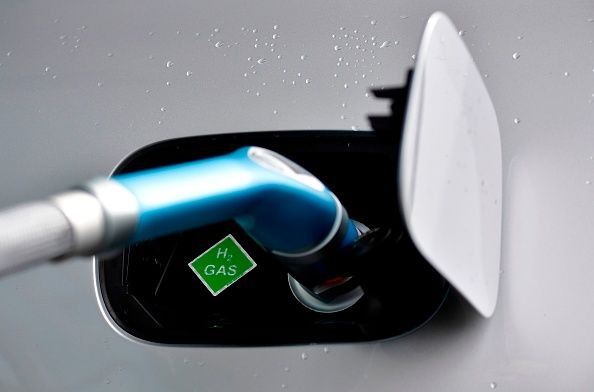3 Reasons Hydrogen Fuels Won't Live Up To The Hype

Materials scientists must be busy. If you take a casual stroll down internet lane, you'll find articles proclaiming the tremendous potential to use zero-carbon hydrogen fuel to displace gasoline-powered vehicles, replace natural gas for heating buildings, and store excess electricity produced by wind and solar farms. If only a low-cost and scalable process could be proven, then society would be one giant leap closer to responding to climate change. Or so the common thinking goes.
It all sounds pretty good on paper, and hydrogen does have some interesting properties, but developing workable commercial-scale manufacturing processes is just one obstacle for the fuel to overcome. There are several practical issues with using hydrogen as a fuel that strongly suggest it won't live up to the hype -- and that show why it would be dangerous for individual investors to blindly believe that a hydrogen economy is inevitable.
1. Hydrogen isn't an ideal fuel.
Hydrogen is simultaneously one of the most energy-dense fuels and one of the least energy-dense fuels. It all depends on the density metric used. When scientists tally the energy per unit mass, hydrogen scores three times better than gasoline. When scientists tally the energy per unit volume, gasoline is more than 10 times better.
The discrepancy stems from the fuel's physical and chemical properties. Hydrogen is the lightest element in the universe, which helps it sport an impressive energy density on a mass basis. However, it's difficult and expensive to squeeze a sufficient mass of hydrogen into a reasonable volume, requiring unique materials, high pressures, and/or supercooled temperatures for proper storage. That's a huge obstacle for the potential of hydrogen-fueled vehicles, which have a limited volume of space to carry fuel.
That hasn't stopped Toyota Motor (NYSE:TM) from jumping to an early lead in the race to develop fuel-cell vehicles with the Mirai. The 2019 model costs $58,500 before state and federal tax credits, scores an impressive fuel economy of 66 miles per gallon in both urban and highway driving, and sports a monstrous 32-gallon fuel tank. But it's unlikely to become the future of transportation for one simple reason: Hydrogen fuel cells require large amounts of platinum-group metals (PGMs).
PGMs serve as the all-important catalyst in a hydrogen fuel cell, which allows it to extract energy from hydrogen in the first place. However, the world doesn't have enough PGMs for transportation applications. While non-PGM catalysts could be developed, investors can't get too excited until new materials are proven at commercial scale.
2. Hydrogen has unique safety concerns.
One of the thornier issues regarding hydrogen fuels is safety. Hydrogen's small molecular size and lightweight attributes mean it will disperse rapidly in an open environment (an advantage over other gases used as fuel), but they also make leaks more likely. Since the gas is difficult for humans to detect and can ignite at very low concentrations in air, there's a significantly greater danger posed by leaks that accumulate indoors compared to other common fuels.
A more pressing safety issue stems from the fact hydrogen flames are virtually invisible to the naked eye during daytime. They also have low radiant heat, meaning you might not realize there's an issue until you're near -- or even standing in -- the flame. That has obvious consequences, but it also suggests the widespread use of hydrogen as a fuel source would require vast investment in training and new equipment for first responders. That's in addition to expensive manufacturing, troublesome storage, and other safety concerns.
3. Significant investment in new infrastructure would be required.
One cool thing about hydrogen distribution is the potential to shuttle the gas around the United States in an underground, supercooled pipeline network that could also transmit electricity with zero efficiency losses. That would theoretically allow solar panels in California to power lights at baseball games in Chicago. But "cool" and "feasible" aren't the same thing.
A nationwide network of supercooled pipelines is an extreme example, but even without that, a hydrogen economy would require an incredible investment in new infrastructure for manufacturing, distributing, and storing hydrogen fuels. International gas and electric utility National Grid (NYSE:NGG) is conducting early research with a range of stakeholders to determine what would be needed to supply hydrogen to buildings for heating and thus displace natural gas. A handful of potential conundrums have already arisen.
Newer natural gas distribution lines made of plastic might actually be able to handle pure hydrogen, but networks couldn't handle both fuels in the same area. What's more, National Grid was already hoping to use some of its iron pipes to take advantage of a proposed program for carbon capture and sequestration in the United Kingdom. Converting to all plastic lines would nix that possibility -- and, ironically, might result in a net carbon emission increase in the near term.
Simply put, the ideal clean fuels of the future would leverage as much existing infrastructure as possible. Hydrogen likely doesn't fit the bill.
Hydrogen isn't a realistic investing opportunity right now
There are a number of practical drawbacks to using hydrogen as a fuel source. It may be cleaner burning than fossil fuels, but the direct environmental advantages alone don't make its widespread use inevitable. Advances in materials for storage and fuel cells, innovative safety technologies, and vast investment in infrastructure would be required to make the hydrogen economy work. Could new materials be developed that overcome these obstacles and make that investment a worthwhile expense? Sure, but that's a long way off. Right now, investors shouldn't be looking to hydrogen as an investment opportunity.
This article originally appeared in the Motley Fool.
Maxx Chatsko has no position in any of the stocks mentioned. The Motley Fool recommends National Grid. The Motley Fool has a disclosure policy.





















